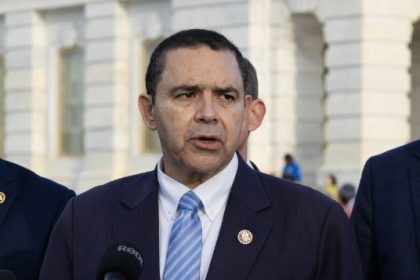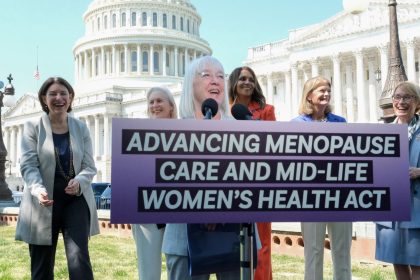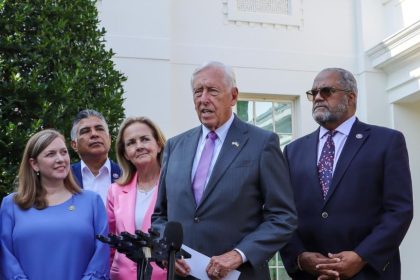Former US Senator Ernest “Fritz” Hollings Dies

Former US Senator and South Carolina Governor Ernest “Fritz” Hollings died early Saturday morning at his home in Isle of Palms, South Carolina, after being in declining health for several weeks. He was 97.
In a statement, his three surviving children said, “Our father, Fritz Hollings, was dedicated to his family, the United States Senate and the people of South Carolina.”
“While we are heartbroken, we hope that in the coming days and weeks as we celebrate our father’s life, all South Carolinian’s will be reminded of his service to our state and nation,” they said.
Hollings was a giant of the Senate, serving in the chamber for 39 years, from November 1966 to January 2005, when he was succeeded by Jim DeMint.
Prior to being elected to the Senate, Hollings was South Carolina’s 106th governor, serving from January 1959 until January 1963. Before that he served as that state’s lieutenant governor, from 1955-1959, and in the state legislature from 1949 to 1955.
In his years on the national stage, Hollings fought to balance the federal budget and was an outspoken advocate of bipartisanship, which may have helped him when in his later years in the Senate when South Carolina became increasingly hospitable to Republicans.
During his first three bids of re-election, he never received less than 60 percent of the vote, and he was in a tight race only once, still managing to garner just over 50 percent of the vote.
Although he could propose controversial legislation from time to time — like proposing to bring back the military draft in 1981 — and be fiery of tongue — once calling an electoral opponent a “goddamn skunk” — Hollings was best known as a champion for fiscal restraint, for the poor and for women, and for helping enact a slew of environmental protections.
Hollings was credited with the creation of the National Oceanic and Atmospheric Administration, with toughening port security and helping to establish more stringent airport security guidelines after the 9/11 terrorist attacks.
He also served as a steadying hand as South Carolina navigated the civil rights era, and he laid the groundwork for South Carolina’s current economic boom.
“By any measure Senator Hollings led one of the most incredible and consequential lives of any member of the Greatest Generation,” said U.S. Senator Lindsey Graham Saturday morning. “With his passing, South Carolina has lost one of her greatest champions and most effective political leaders.”
Graham went on to call Hollings “a giant of a man who was often called the ‘senator from central casting,’ recalling how the elder man took him under his wing and helped him get established as South Carolina’s junior senator.
Hollings could empathize with Graham’s station at the time. Hollings himself had been the state’s junior senator for nearly his entire time in Washington, stepping up to senior senator only after the retirement of Republican Senator Strom Thurmond in January 2003.
“[Hollings] led our state through the travails of the civil rights movement with dignity and went on to become one of the most effective senators to ever serve,” Graham said.
“Until his dying day, Fritz Hollings was always advocating and urging for policies that would make our country strong,” the senator added.
Upon learning of Hollings’ passing, House Majority Whip James E. Clyburn said, “America has lost a one of a kind statesman.”
“Fritz Hollings was an astute politician who was motivated by service. He was truly devoted to advancing the cause of our democracy and bettering the lives all Americans,” Clyburn said.
“Today, we lost the most transformational leader our state has ever seen,” said Representative Joe Cunningham. “Fritz Hollings was a true statesman who exemplified character, courage, integrity, and honor.
“We are all better off because of his life and service to our nation, state and the Lowcountry,” Cunningham said.
Tall and white-haired, Hollings was a frequent sight around his native Charleston in his later years, and smiled appreciably when greeted by well-wishers.
He would serve in Washington, D.C., for nearly 40 years, all but two of which were as the “junior” senator from South Carolina to Republican Sen. Strom Thurmond.
Hollings was born in Charleston, South Carolina on Jan. 1, 1922, the son of a local merchant.
At age 16, he enrolled at The Citadel and upon his graduation four years later, in 1942, joined the Army and saw action in North Africa and the south of France.
After the war, Hollings returned to Charleston where he married his first wife, Patricia Salley, in 1946. They eventually had four children. To support his growing family, Hollings turned to law, graduating from the University of South Carolina Law School.
But it wasn’t long before a different life beckoned. In 1948, at the age of 27, Hollings won a seat in the state House of Representatives. His tenure coincided with the rise of the civil rights movement, and Hollings’ early career initially reflected his support of continued segregation.
It was a period in the South when federal intervention was considered by many far worse than the daily infringement on the civil rights of a significant percentage of its population.
When Hollings, in one of the first legislative accomplishments of his long life, pushed for the passage of South Carolina’s first gas tax, the revenue it raised was used by then-governor James Byrnes to improve black schools in a bid to hold off federally-mandated integration.
The prevailing attitude of the era was summed up by one of the defense attorneys in the 1948 trial in Greenville, South Carolina, of a white mob accused of killing of black man who himself had been accused of murder.
“To the historian, the South is the Old South,” the attorney said, his words immortalized in a New Yorker magazine account of the case. “To the poet, it is the Sunny South. To the prophet, it is the New South. But to us, it is our South. I wish to God they’d leave us alone.”
In time, however, Hollings concluded segregationists were on the wrong side of a moral issue and the prophets of a New South on the side of the angels. While in the state legislature he wrote the state’s anti-lynching law and, as governor, he later oversaw the integration of Clemson University.
By the time he reached the U.S. Senate, Hollings was considered a master politician, who occasionally got himself into trouble for brash statements.
The biggest came when he called then-Sen. Howard Metzenbaum of Ohio, who is Jewish, “the Senator from B’nai B-rith” on the Senate floor in a reference to the Jewish service organization.
Hollings eventually made amends with Metzenbaum, who died in 2008, and Hollings’ words were stricken from The Congressional Record.
But it was during campaigns back home in South Carolina that Hollings could be at his most contentious.
When Henry McMaster, now South Carolina’s governor, ran against Hollings for Senate in 1986, the upstart Republican jokingly suggested Hollings submit to a drug test.
Hollings fired back, “I’ll take a drug test, if you’ll take an IQ test.”
Years later, in 1998, then-Representative Robert Inglis challenged Hollings, attempting to contrast his civility with what he claimed was the incumbent’s coarseness.
A young reporter covering the race, John Harwood, now of CNBC, was granted an interview with Hollings and asked the senator what he thought of Inglis’ strategy.
“He can kiss my ass,” Hollings said
If Hollings delighted in the rough and tumble of politics on occasion, he was consistently serious about the work.
In the late 1960s, he toured the poorest reaches of the rural South, producing the book “The Case Against Hunger.”
He then pushed for the creation of the federal Women, Infants and Children program to feed poor pregnant women.
In the early 1980s, Hollings co-authored the bipartisan Gramm-Rudman-Hollings Act which sought to put caps on the federal spending and mandated balancing the federal budget.
Eventually, he grew frustrated with what should have been one of his signature pieces of legislation, complaining that federal budget writers found ways to skirt its provisions.
Locally, he championed the creation of the Congaree National Park near Columbia, South Carolina, and the creation of the Hollings Cancer Center at the Medical University of South Carolina in Charleston.
Hollings was also instrumental in securing federal funding for the Arthur Ravenel Jr. Bridge, now a Charleston-area landmark, which replaced the decrepit and dangerous Cooper River bridge in 2005.
Because of his power, his tenure and what he was able to accomplish, many in his home state sought to name things in his honor, but it was an honor he turned down that many remembered on Saturday.
In 2015, Hollings asked that his name be removed from Charleston’s federal courthouse in favor of J. Waties Waring, the federal judge in Charleston whose dissent in an early school desegregation case formed the legal foundation for the U.S. Supreme Court’s decision in Brown v. Board of Education, which desegregated public schools in 1954.
In his dissent, Waring had written, “Segregation is per se inequality.”
In asking that the building be named to honor the judge, Hollings said simply, “I just got the money for the building … He made history in it.”
Two years later, the Hollings’ request was commemorated with the unveiling of a statue of his likeness outside the courthouse.
Then-Vice President Joe Biden delivered the keynote address at the dedication, describing Hollings’ request to rename the courthouse in honor of the judge as the epitome of his selfless service to the nation.
Hollings and Biden had been close friends for years. It was the elder senator and his second wife, Rita Hollings, whom everyone called “Peatsy,” who convinced Biden to stay in the Senate after the 1972 car accident that killed Biden’s wife and daughter.
“They in a sense saved my life,” Biden said of the couple in 2007.
Biden and Hollings reportedly spoke by phone as recently as last Monday, though there’s no word whether they discussed Biden’s impending presidential bid.
Hollings himself briefly ran for president in 1984, but bowed out in the run-up to the New Hampshire primary after his candidacy failed to gain any traction. He later said his bid was an attempt to help Southern Democrats get over President Jimmy Carter’s loss to Republican Ronald Reagan four years earlier.
Hollings made a cameo appearance in the 1996 political drama “City Hall,” starring Al Pacino, John Cusack and Bridget Fonda, playing a U.S. Senator.
He devoted his last years to campaigning for Alzheimer’s research, after Peasty Hollings died of complications of the disease in 2012.
Hollings will lie in repose at the South Carolina statehouse in Columbia, South Carolina, with a public observances to be held on April 14, from 3 p.m. to 6 p.m.
His funeral will be held at his alma mater, The Citadel, on April 16 at 11 a.m. A private burial is planned after the funeral.
“One of South Carolina’s greatest lions roars no more,” South Carolina Governor Henry McMaster said in a statement.
“Fierce, bold, and robust — the sounds of Fritz Hollings’ vision and drive for the Palmetto State will continue to be heard by generations,” the governor said. “The greatness and success of this state has benefited from the hand of his leadership.”
In lieu of flowers, memorials can be made to the Hollings Cancer Center at the Medical University of South Carolina, 86 Jonathan Lucas St., Charleston, SC 29425.























